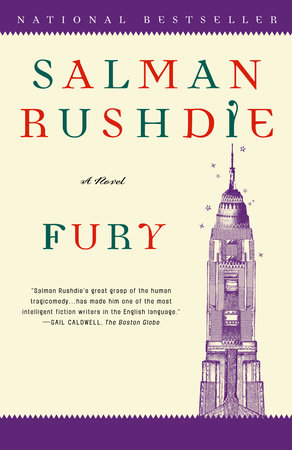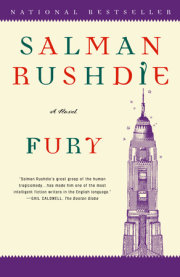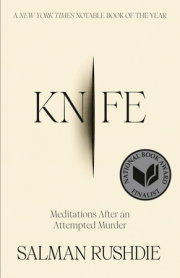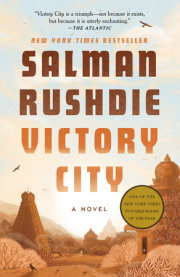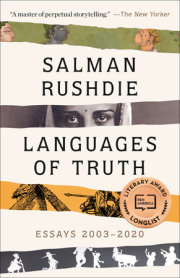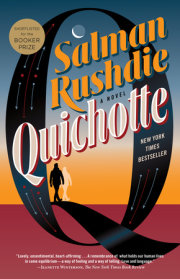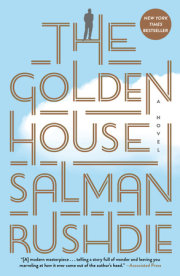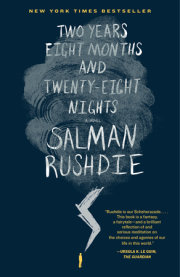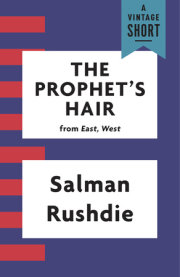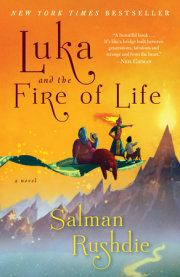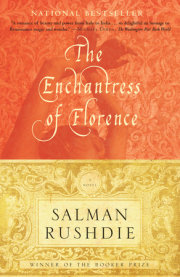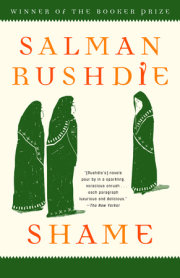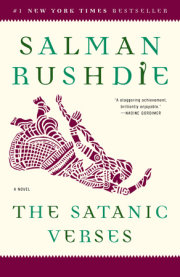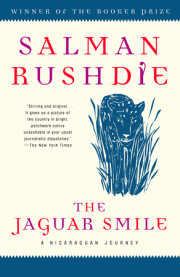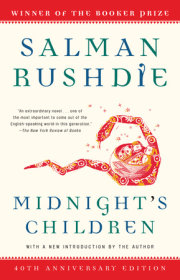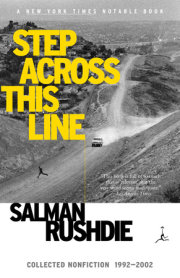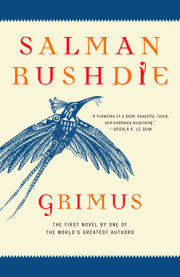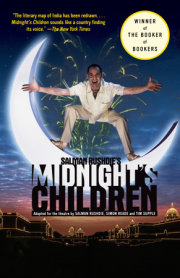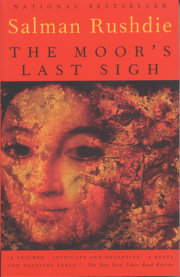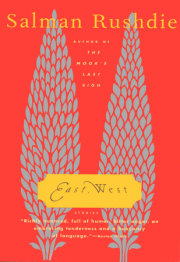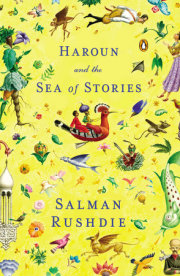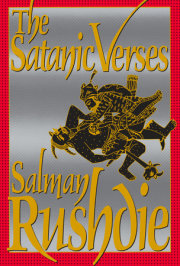Professor Malik Solanka, retired historian of ideas, irascible dollmaker, and since his recent fifty-fifth birthday celibate and solitary by his own (much criticized) choice, in his silvered years found himself living in a golden age. Outside his window a long, humid summer, the first hot season of the third millennium, baked and perspired. The city boiled with money. Rents and property values had never been higher, and in the garment industry it was widely held that fashion had never been so fashionable. New restaurants opened every hour. Stores, dealerships, galleries struggled to satisfy the skyrocketing demand for ever more recherch produce: limited-edition olive oils, three-hundred-dollar corkscrews, customized Humvees, the latest anti-virus software, escort services featuring contortionists and twins, video installations, outsider art, featherlight shawls made from the chin-fluff of extinct mountain goats. So many people were doing up their apartments that supplies of high-grade fixtures and fittings were at a premium. There were waiting lists for baths, doorknobs, imported hardwoods, antiqued fireplaces, bidets, marble slabs. In spite of the recent falls in the value of the Nasdaq index and the value of Amazon stock, the new technology had the city by the ears: the talk was still of start-ups, IPOs, interactivity, the unimaginable future that had just begun to begin. The future was a casino, and everyone was gambling, and everyone expected to win.
On Professor Solanka’s street, well-heeled white youths lounged in baggy garments on roseate stoops, stylishly simulating indigence while they waited for the billionairedom that would surely be along sometime soon. There was a tall, green-eyed young woman with steeply slanting Central European cheekbones who particularly caught his sexually abstinent but still roving eye. Her spiky strawberry-blond hair stuck out clown-fashion from under a black D’Angelo Voodoo baseball cap, her lips were full and sardonic, and she giggled rudely behind a perfunctory palm as old-world, dandyish, cane-twirling little Solly Solanka in straw Panama hat and cream linen suit went by on his afternoon walk. Solly: the college identity he’d never cared for but had not entirely managed to lose.
“Hey, sir? Sir, excuse me?” The blonde was calling out to him, in imperious tones that insisted on a reply. Her satraps became watchful, like a Praetorian guard. She was breaking a rule of big-city life, breaking it brazenly, sure of her power, confident of her turf and posse, fearing nothing. This was just pretty-girl chutzpah; no big deal. Professor Solanka paused and turned to face the lounging goddess of the threshold, who proceeded, unnervingly, to interview him. “You walk a lot. I mean, five or six times a day, I see you walking someplace. I’m sitting here, I see you come, I see you go, but there’s no dog, and it’s not like you come back with lady friends or produce. Also, the hours are strange, it can’t be that you’re going to a job. So I’m asking myself, Why is he always out walking alone? There’s a guy with a lump of concrete hitting women on the head across town, maybe you heard that, but if I thought you were a weirdo, I wouldn’t be talking to you. And you have a British accent, which makes you interesting too, right. A few times there we even followed you, but you weren’t going anywhere, just wandering, just covering ground. I got the impression you were looking for something, and it crossed my mind to ask you what that might be. Just being friendly, sir, just being neighborly. You’re kind of a mystery. To me you are, anyhow.”
Sudden anger rose in him. “What I’m looking for,” he barked, “is to be left in peace.” His voice trembled with a rage far bigger than her intrusion merited, the rage which shocked him whenever it coursed through his nervous system, like a flood. Hearing his vehemence, the young woman recoiled, retreating into silence.
“Man,” said the largest, most protective of the Praetorian guard, her lover, no doubt, and her peroxide-blond centurion, “for an apostle of peace you sure are filled up with war.”
She reminded him of someone, but he couldn’t remember whom, and the little failure of memory, the “senior moment,” nagged at him infuriatingly. Luckily she wasn’t there anymore, no one was, when he returned from the Caribbean carnival damp-hatted and soaked through after being caught unprepared by a squall of hard, hot rain. Passing the Congregation Shearith Israel on Central Park West (a white whale of a building with a triangular pediment supported by four count ’em four massive Corinthian columns), Professor Solanka scurrying through the downpour remembered the newly bat-mitzvahed thirteen-year-old girl he’d glimpsed through the side door, waiting knife in hand for the ceremony of the blessing of the bread. No religion offers a ceremony of the Counting of the Blessings, mused Professor Solanka: you’d think the Anglicans, at least, would have come up with one of those. The girl’s face glowed through the gathered gloom, its young round features utterly confident of achieving the highest expectations. Yes, a blessed time, if you cared to use words like “blessed”; which Solanka, a skeptic, did not.
On nearby Amsterdam Avenue there was a summer block party, a street market, doing good business in spite of the showers. Professor Solanka surmised that in the greater part of the planet the goods piled high on these cut-price barrows would have filled the shelves and display cabinets of the most exclusive little boutiques and upper-echelon department stores. In all of India, China, Africa, and much of the southern American continent, those who had the leisure and wallet for fashion—or more simply, in the poorer latitudes, for the mere acquisition of things—would have killed for the street merchandise of Manhattan, as also for the cast-off clothing and soft furnishings to be found in the opulent thrift stores, the reject china and designer-label bargains to be found in downtown discount emporia. America insulted the rest of the planet, thought Malik Solanka in his old-fashioned way, by treating such bounty with the shoulder-shrugging casualness of the inequitably wealthy. But New York in this time of plenty had become the object and goal of the world’s concupiscence and lust, and the “insult” only made the rest of the planet more desirous than ever. On Central Park West the horse-drawn carriages moved up and down. The jingling of the bells on the harnesses sounded like cash in hand.
The season’s hit movie portrayed the decadence of Caesar Joaquin Phoenix’s imperial Rome, in which honor and dignity, not to mention life-and-death actions and distractions, were to be found only in the computer-regenerated illusion of the great gladiatorial arena, the Flavian Amphitheatre or Colosseum. In New York, too, there were circuses as well as bread: a musical about lovable lions, a bike race on Fifth, Springsteen at the Garden with a song about the forty-one police gunshots that killed innocent Amadou Diallo, the police union’s threat to boycott the Boss’s concert, Hillary vs. Rudy, a cardinal’s funeral, a movie about lovable dinosaurs, the motorcades of two largely interchangeable and certainly unlovable presidential candidates (Gush, Bore), Hillary vs. Rick, the lightning storms that hit the Springsteen concert and Shea Stadium, a cardinal’s inauguration, a cartoon about lovable British chickens, and even a literary festival; plus a series of “exuberant” parades celebrating the city’s many ethnic, national, and sexual subcultures and ending (sometimes) in knifings and assaults on (usually) women. Professor Solanka, who thought of himself as egalitarian by nature and a born-and-bred metropolitan of the countryside-is-for-cows persuasion, on parade days strolled sweatily cheek by jowl among his fellow citizens. One Sunday he rubbed shoulders with slim-hipped gay-pride prancers, the next weekend he got jiggy beside a big-assed Puerto Rican girl wearing her national flag as a bra. He didn’t feel intruded upon amid these multitudes; to the contrary. There was a satisfying anonymity in the crowds, an absence of intrusion. Nobody here was interested in his mysteries. Everyone was here to lose themselves. Such was the unarticulated magic of the masses, and these days losing himself was just about Professor Solanka’s only purpose in life. This particular rainy weekend there was a calypso beat in the air, not the mere Harry Belafonte Jamaica-farewells and jackass-songs of Solanka’s somewhat guiltily fond memory (“Now I tell you in a positive way / don’ tie me donkey down dere / ’cause me donkey will jump and bray / don’ tie me donkey down dere!”), but the true satirical music of the Jamaican troubadour-polemicists, Banana Bird, Cool Runnings, Yellowbelly, live in Bryant Park and on shoulder-high boomboxes up and down Broadway.
When he got home from the parade, however, Professor Solanka was seized by melancholy, his usual secret sadness, which he sublimated into the public sphere. Something was amiss with the world. The optimistic peace-and-love philosophy of his youth having given him up, he no longer knew how to reconcile himself to an increasingly phony (he loathed, in this context, the otherwise excellent word “virtual”) reality. Questions of power preyed on his mind. While the overheated citizenry was eating these many varieties of lotus, who knew what the city’s rulers were getting away with—not the Giulianis and Safirs, who responded so contemptibly to the complaints of abused women until amateur videos of the incidents showed up on the evening news, not these crude glove-puppets, but the high ones who were always there, forever feeding their insatiable desires, seeking out newness, devouring beauty, and always, always wanting more? The never encountered but ever present kings of the world—godless Malik Solanka avoided crediting these human phantoms with the gift of omnipresence—the petulant, lethal Caesars, as his friend Rhinehart would say, the Bolingbrokes cold of soul, the tribunes with their hands up the mayor’s and police commissioner’s Coriolanuses . . . Professor Solanka shuddered faintly at this last image. He knew himself well enough to be conscious of the broad scarlet streak of vulgarity in his character; still, the crude pun shocked him when he thought of it.
Puppet-masters were making us all jump and bray, Malik Solanka fretted. While we marionettes dance, who is yanking our strings?
The phone was ringing as he came through his front door, the rain still dripping off his hat brim. He answered it snappishly, snatching off its base the cordless unit in the apartment’s entrance hall. “Yes, what, please?” His wife’s voice arrived in his ear via a cable on the Atlantic bed, or maybe in these days when everything was changing it was a satellite high above the ocean, he couldn’t be sure. In these days when the age of pulse was giving way to the age of tone. When the epoch of analog (which was to say also of the richness of language, of analogy) was giving way to the digital era, the final victory of the numerate over the literate. He had always loved her voice. Fifteen years ago in London he had telephoned Morgen Franz, a publishing friend who by chance was away from his desk, and Eleanor Masters, passing by, had picked up the clamoring instrument; they had never met but ended up talking for an hour. A week later they dined at her place, neither of them alluding to the inappropriateness of so intimate a venue for a first date. A decade and a half of togetherness ensued. So, he fell in love with her voice before the rest of her. This had always been their favorite story about each other; now, of course, in love’s brutal aftermath, when memory was reinvented as pain, when voices on the phone were all they had left, it had become one of the saddest. Professor Solanka listened to the sound of Eleanor’s voice and with some distaste imagined it being broken up into little parcels of digitized information, her low lovely voice first consumed and then regurgitated by a mainframe computer probably located someplace like Hyderabad-Deccan. What is the digital equivalent of lovely, he wondered. What are the digits that encode beauty, the number-fingers that enclose, transform, transmit, decode, and somehow, in the process, fail to trap or choke the soul of it. Not because of the technology but in spite of it, beauty, that ghost, that treasure, passes undiminished through the new machines.
Copyright © 2001 by Salman Rushdie. All rights reserved. No part of this excerpt may be reproduced or reprinted without permission in writing from the publisher.

